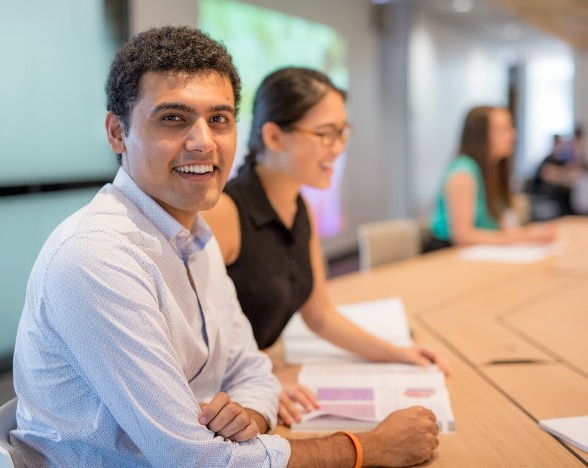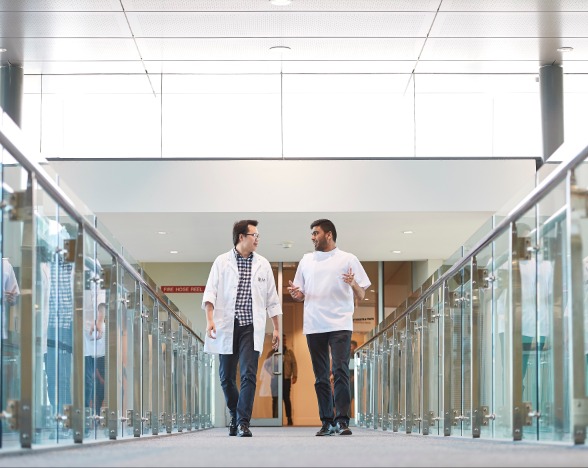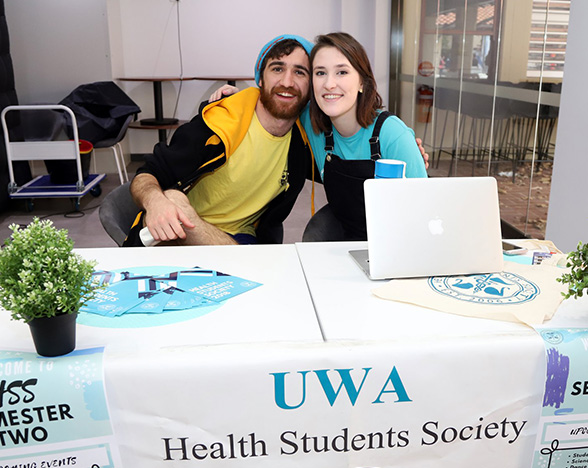Health and Biomedical Sciences
Your allocated student office is your one-stop shop for all your course-related queries. We can assist with:
- course advice and creating a study plan
- checking your enrolment
- advising on global and extra-curricular experiences
- directing you to student support services
- helping you with complex matters regarding special consideration, credit transfer, approved leave, academic progression, graduation eligibility and other requests
The Health and Science Student Advising Office is located in the Agriculture Central building at the Perth campus.
Visit us during our office hours, Monday - Thursday 9.30am - 4.30pm, Friday 10am - 4.30pm, and closed Tuesday between 12- 1pm.
Closed weekends, public holidays and university shutdown period.
Phone us on +61 8 6488 3235
Email us via askUWA
Featured opportunity
Population Health Seasonal School
Undertake a one-week intensive, out-of-semester unit to gain course credit or for your professional development. Units include Food and Nutrition in Population Health, Clinical Epidemiology and more.
Get involved
Discover a number of student-run faculty societies through UWA's Student Guild.
These clubs and societies represent and support members across the various disciplines of health and medical sciences.
Join up to enjoy a range of social, sporting, volunteer and academic functions throughout the year.
Some of the clubs and societies include:
Mentoring programs

Student MeDMentor
In the first few weeks of the course, you'll be paired with a senior medical student mentor – your Student MeDMentor. These are senior students who have volunteered and undertaken UniMentor training. The aim is that you develop an ongoing mentor relationship with them to assist you in transitioning to life as a UWA MD student and eventually becoming a qualified doctor.
You can approach your Student MeDMentor to discuss issues and ideas that develop as part of the MD course. You may ask for feedback or advice to clarify situations. We recommend meeting with your Student MeDMentor at least twice a year.
It is important that you have a Student MeDMentor for all of Year 1. Beyond Year 1, you can choose not to continue to have a Student MeDMentor.
Having a Student MeDMentor provides you with:
- Pastoral care (orientation to the University and MD course, encourage good self-care habits, meeting regularly)
- Assistance with your professional development (attitudes and behaviour, reflective practice, legal and ethics)
- Feedback on how to achieve your professional and academic goals e.g. leadership, educator, advocacy, clinician and/or scholar
- Respect for your beliefs and opinions but also encourage you to reflect and consider alternative viewpoints
For more information, contact the Professional Development and Mentorship Academic Services Officer on [email protected] or +61 8 6457 3804.

Clinician-student mentoring
UWA is the only Australian medical school to have a longitudinal mentoring program where all medical students have a clinical mentor involved in the student’s professional development for the duration of the course.
The program comprises a minimum number of meetings and activities that must be completed for each academic year. As your mentor is a qualified doctor, they have an important role in providing you with feedback and identifying if you need assistance.
You can approach your mentor to discuss issues and ideas, complete assigned tasks, or ask for feedback or advice. Your mentor's questions and comments may help you see another perspective, consider other options, and review your plans or actions.
Minimum requirements
- Meet with your mentor at least once (twice in Year 3) to discuss your development.
- Ensure your Interview Record Sheets are submitted to the Faculty. Your forms must be submitted to the mentoring administrator.
Choosing a mentor
We encourage you to choose your own mentor. Many students find this leads to a more rewarding experience and ensures you have a mentor in your preferred area of focus.
When nominating a mentor on your own, ensure the following criteria are met:
- A medically qualified clinician (not a direct family member), qualified for a minimum of three years.
- A person who is agreeable about meeting you officially for personal and professional development.
- This person must be able to follow the timetable as set out in the Guidebook.
For more information, contact the Professional Development and Mentorship Academic Services Officer on [email protected] or +61 8 6457 3804.
Support for postgraduate research students
For general information on research degrees, visit our Research page or head to the Graduate Research School website.
Computer access
New full-time HDR students have access to a dedicated UWA laptop/computer, and part-time HDR students have shared access to a UWA computer. Current HDR students may also request a UWA computer and these requests will be supported on a priority basis. To arrange access, contact [email protected].
Email accounts
We send official correspondence to your email, so check your messages regularly. You'll need an active UniID account to access your emails. In addition to your general UWA email address, you are also eligible for a research email alias. The default format is: [email protected]. Visit the FAQ on askUWA for more.
Photocopying
Access to a photocopier/printer, subject to monthly limits, is available to all full-time HDR students. Your UWA computer will be networked to a printer and your Academic Services team can provide you with a personal photocopier access code, where applicable.
Study spaces
Specific workstations have been set aside across the Faculty for you to use. If you'd like to access one of these spaces, contact your Academic Services team to check availability.
HDR Support Grant
Allocations of up to $1,500 per student per annum (when justified in a budget in the proposal document):
- 3 years for PhD and 2 years for Masters by Research;
- Full-time and part-time students receive their full allocation within 3 years of candidature (to make the process efficient, carry-forward of funds across the years until thesis submission);
- Students will receive their first allocation within 2 months of commencing;
- Any surplus funds will be rolled up 6 months after completion, to be used for future HDR student allocations;
- Students will continue to have access to computing equipment via IT;
- Students can apply for a travel grant of up to $1,850 through the Graduate Research School; and
- Existing students will have their current funding arrangements grandfathered.
How to access your funds
To request a purchase or reimbursement, complete the HDR Student Expense form and have it approved/signed by your coordinating supervisor. HDR Student Expense forms should be submitted directly to [email protected].
Contact us
- Finance queries: [email protected]
- IT queries: [email protected]
- Concur queries: [email protected]
- Pre-candidature and scholarship queries: [email protected]
- General queries: Graduate Research School
-
Academic Services teams and GRCs by School
School of Allied Health
Academic Services: [email protected]
GRC: [email protected]
Contact: Professor Lee Yong Lim (Pharmacy and Podiatric Medicine), Dr Susan Young (Social Works and Health Professions Education)
School of Biomedical Sciences
Academic Services: [email protected]
GRC QEII: [email protected]
Contact: Associate Professor Allison Imrie
GRC Royal Perth Hospital
Email: [email protected]
Contact: Dr Vance Matthews
Centre for Opthamology and Visual Sciences
Academic Services: [email protected]
GRC: [email protected]
Contact: Dr Omar Kujan
Dental School
Academic Services: [email protected]
GRC QEII: Oral Health Centre of WA
Email: [email protected]
Contact: Dr Omar Kujan
Medical School - Royal Perth Hospital and Royal Perth Medical Research Foundation
Academic Services: [email protected]
GRC: [email protected]
Contact: Dr Vance Matthews
Medical School - Fiona Stanley Hospital
Academic Services: [email protected]
GRC: [email protected]
Contact: Dr Jane Allan
Medical School - all other sites
Academic Services: [email protected]
GRC Medicine: [email protected]
Contact: Dr Jane Allan
GRC Paediatric and Child Health: [email protected]
Contact: Associate Professor Sunalene Devadason
GRC Surgery: [email protected]
Contact: Professor Barry Iacopetta
GRC GP, Psychiatry, Neuroscience, Emergency Medicine, Rural Clinical School Email: [email protected]
Contact: Associate Professor Nahal Mavaddat
School of Population and Global Health
Academic Services: [email protected]
GRC: [email protected]
Contact: Associate Kevin Murray
More for HMS students
Faculty computer resources
-
Computer lab locations
The Faculty has computer labs where you can use:
- Microsoft Office
- EndNote
- Internet
- 2GB of secure, backed-up data storage assigned to you, accessible as the H: drive on any of the lab PCs on campus
- Printers
- UNIFI wireless service
Some labs also have SPSS, Stata and SAS available for use. This software is provided by the associated school.
Fiona Stanley Hospital Perkins
- South Lab, Lower Ground Area, Perkins Building, Fiona Stanley Hospital, Murdoch
- Four computers
- Laser printing
- 8am to 5pm access
Perth campus, Anatomy and Human Biology, computer room G45
- 24 computers
- Laser printing
- 24-hour access – contact the IT ServiceDesk online or by telephone (+61 8) 9346 7325 to arrange swipe card access to this lab
FJ Clark, QE2 Medical Centre
- FJ Clark lecture theatre complex
- 24 computers
- Laser printing
- 24-hour access – contact the IT ServiceDesk online or by telephone (+61 8) 9346 7325, to arrange swipe card access to this lab
Fremantle Hospital
- Fremantle Hospital T Block,room T5.14
- Four computers
- Laser printing
- 8am to 5pm access
Joondalup Health Clinic
- The University of Western Australia, Community Clinical School, First floor, Joondalup Private Hospital
- Seven computers
- Laser printing
- 8am to 5pm access
King Edward Memorial Hospital
- King Edward Memorial Hospital Department of Obstetrics and Gynaecology, A Block, level 2
- Eight computers
- Laser printing
- 8am to 5pm access
Nedlands campus
School of Population Health computer labs, corner of Clifton Street and Stirling Highway
- 50 computers
- Laser printing
- 24-hour access
Osborne Park Hospital
- Osborne Park Hospital, Level 2, student resource room
- Three computers
- 8am to 5pm access
Pharmacology and Pathology
- M Block Computing Suite, Ground Floor, M block, QE2 Medical Centre, Nedlands
- 170 computers
- Laser printing
- 8am to 5pm access
Podiatric Medicine Unit
- Rooms G17 and G19 (Undergraduate) and G02 (Postgraduate), Park Avenue Building, corner Park and Crawley Avenues, Crawley
- 13 computers
- 24-hour access with campus card for Podiatric Medicine students
Princess Margaret Hospital
- Department of Paediatrics, Administration Building, Level 4, Room 4.22
- Six computers
- Laser printing
- 8am to 5pm access
Royal Perth Hospital
- Royal Perth Hospital Colonial House, above the library
- Four computers
- Laser printing
- 8am to 5pm access
Important dates
For important dates regarding Doctor of Dental Medicine, Doctor of Medicine, Doctor of Podiatric Medicine, Doctor of Podiatric Surgery, Doctor of Optometry and Master of Pharmacy, please visit this page
Information for Doctor of Medicine students
Professional behaviour policy
Personal and professional development is one of the main themes of a health professions degree at UWA. The School of Health and Medical Sciences Professional Procedures have been developed to facilitate a consistent and equitable approach to the recording, monitoring and evaluation of misconduct in the area of professionalism and professional behaviour of all students enrolled in coursework programs of study offered by the Faculty.
While the Professional Procedures do not include students undertaking undergraduate majors and research degrees, it is recognised that all UWA students are governed by related policies at the University level. It is intended that the School Policy on Professional Behaviour for Students be read in conjunction with the UWA Regulations for student conduct and discipline and UWA Policy on Academic Conduct. The Professional Procedures can be found in the Schedule of the University Policy on Courses - Experiential Learning.
MD professional behaviour assessment procedure
All MD units have professional behaviour outcomes and assessment components. Identifying concerning or unsatisfactory behaviours is essential for ensuring MD students can receive appropriate support to enable them to graduate with the high standard of professional behaviours essential for doctors.
Progress Rules – Doctor of Medicine
The Progress Rules sit supplementary to the Doctor of Medicine course rules. They govern what constitutes satisfactory progress in the course and what rules are applied in cases of unsatisfactory progress.
Medical student involvement in patient care
This protocol has been developed by the Medical School to ensure appropriate consent is obtained for medical student involvement with patient care and focusses on medical student-patient examinations, as the legal implications of performing an examination without consent are significant.
Scholarly activity in the MD
Scholarly activity is a distinctive feature of the UWA Doctor of Medicine (MD) degree.
It allows students to explore the development and application of scholarship in a strikingly diverse range of contexts, broadly grouped into three streams:
- Service
- Research
- Coursework
Students choose their preferred stream, which becomes the focus of their scholarly activity undertaken in years three (Semesters 1 and 2) and four (Semester 1) of the program.
Service
Students who select service learning will be matched with a not-for-profit (NFP) organisation for years three and four of the program. Students will work on relevant project identified by the host organisation.
Research, Audit and Systematic Review
Students who choose research as their scholarly activity will be matched with a research supervisor and project for years three and four of the program. Ideally the student will have prior research training or work in a group with a research-experienced MD student. Note that for students planning on a PhD in the future, a solo research project is recommended. For less-experienced students, a clinical audit or systematic review could provide entry into improving clinical knowledge and practice.
Coursework
Students who choose coursework are now able to complete units towards a further approved degree in Public Health, Health Professions Education or the Master of Aboriginal Health. Students can choose units that will contribute 18 points towards a master's qualifications as a core part of their degree. Students who choose coursework will undertake approved units for years three and four of the program.



